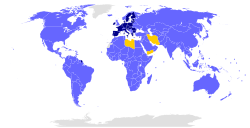Paris climate agreement
| Paris Agreement under the United Nations Framework Convention on Climate Change | |
|---|---|

Parties
Signatories
Parties also covered by European Union ratification
Signatories also covered by European Union ratification
|
|
| Drafted | 30 November – 12 December 2015 |
| Signed | 22 April 2016 |
| Location | New York |
| Sealed | 12 December 2015 |
| Effective | 4 November 2016 |
| Condition | Ratification/Accession by 55 UNFCCC Parties, accounting for 55% of global greenhouse gas emissions |
| Signatories | 195 |
| Parties | 159 |
| Depositary | Secretary-General of the United Nations |
| Languages | Arabic, Chinese, English, French, Russian and Spanish |
|
|
|
The Paris Agreement (French: Accord de Paris), Paris climate accord or Paris climate agreement, is an agreement within the United Nations Framework Convention on Climate Change (UNFCCC) dealing with greenhouse gas emissions mitigation, adaptation and finance starting in the year 2020. The language of the agreement was negotiated by representatives of 196 parties at the 21st Conference of the Parties of the UNFCCC in Paris and adopted by consensus on 12 December 2015. As of August 2017, 195 UNFCCC members have signed the agreement, 159 of which have ratified it.
In the Paris Agreement, each country determines, plans and regularly reports its own contribution it should make in order to mitigate global warming. There is no mechanism to force a country to set a specific target by a specific date, but each target should go beyond previously set targets.
In 2017, U.S. President Donald Trump announced his intention to withdraw the United States from the agreement, causing widespread condemnation in the European Union and many sectors in the United States. Under the agreement, the earliest effective date of withdrawal for the U.S. is November 2020.
In July 2017, France’s environment minister Nicolas Hulot announced France’s five-year plan to ban all petrol and diesel vehicles by 2040 as part of the Paris Agreement. Hulot also stated that France would no longer use coal to produce electricity after 2022 and that up to €4bn will be invested in boosting energy efficiency.
The aim of the convention is described in Article 2, "enhancing the implementation" of the UNFCCC through:
Countries furthermore aim to reach "global peaking of greenhouse gas emissions as soon as possible". The agreement has been described as an incentive for and driver of fossil fuel divestment.
The Paris deal is the world's first comprehensive climate agreement.
...
Wikipedia
